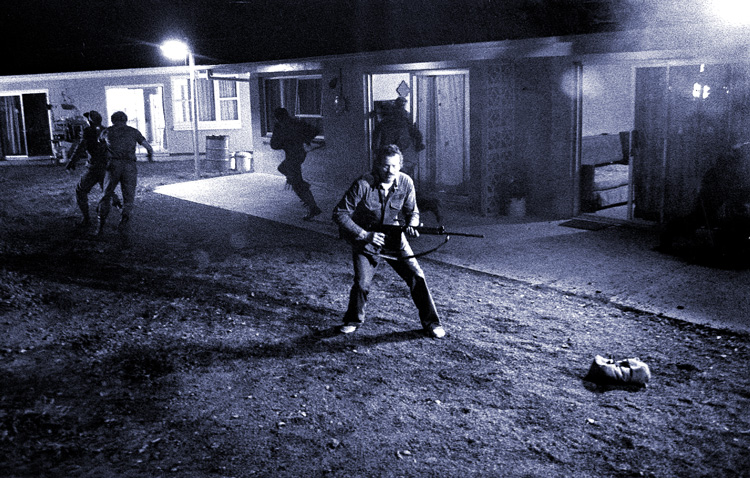
Roger Donaldson has been promising himself a night off for several weeks. He has been on the move, seeing people, persuading, hassling, fighting, pushing. Everything is poised, ready to go ... shooting of his feature film Sleeping Dogs starts the following week.
It is time for a break. He deserves it. Silent Movie is on, a comedy ... just the thing. He'll have a few laughs and relax.
Halfway through the film he gets the shakes. He huddles in his seat, trying to control himself. Scene after scene shows all the things he hasn't done.
He realises there is no way he can start shooting next week. He is totally unprepared. Silent Movie rolls on unnoticed on the screen - Donaldson is caught up in the movie in his head, the coming disaster.
He goes home and grabs a notebook. He makes detailed notes on every scene in Sleeping Dogs. He thinks them through, one after the other, and makes decision after decision. They are not easy to make, because he has to think out exactly what he is trying to get across in each scene.
Lots and lots and lots of small decisions ... what sort of car, whether it should be a certain colour, what location is best.
By sun-up he has got his confidence back. He has made something like 3,000 decisions, including the big one ... he has convinced himself he can pull it off.
The motel massacre is a test on several levels - whether Donaldson can show how an ordinary New Zealander can get involved in such violence ... whether Donaldson can organise a film crew and acting force of more than 30 people ... whether the tight budget can stand the strain of last-minute problems.
It is a long and complicated set-up, involving a dozen soldiers, rifles firing, two big bombs and a couple of flashes. They have been working all night and dawn is not far away.
An alarm rings. Bright spotlights flash on. Soldiers and police "specials" tumble out of the motels half asleep, grabbing clothes and weapons as they come.
American adviser, actor Warren Oates, calls out to his sergeant.
"Did you sound the alarm, Andretti?"
Andretti: "No, I thought you did."
They look at each other ... Ambush!
BOOM!
Everybody jumps, startled, dives for cover.
The bang is so loud and unexpected that lines are forgotten, the sound man drops his mike. An extra triggers off a rifle as he is blown over backwards.
"Cut." The crew clusters around Donaldson, demanding to know about the next bang. It was so big they had forgotten their jobs, jumped, lost sequence.
Donaldson is pleased with the effects; he thinks they are exactly right. "Did you use gunpowder?" he asks special effects director Geoff Murphy.
"No, just petrol. The detonator was chlorate, it has more grunt."
Donaldson grins, happy.
The second assistant puts in: "Yeah, last night when we let one off early in the morning the postmaster leapt out of bed and rushed across to the post office - he thought someone had blown his safe."
Dawn is coming closer.
They shoot a second take. Donaldson turns to camera operator Paul Leach. "How was that - Ok for you?"
Leach hesitates. He is a small, nuggety man with a quiet, almost shy manner. He is meticulous in his work. "Well ... it seemed a bit empty behind Oates as I panned with him, not much action behind him."
Donaldson thinks for a moment. Tall, lanky, he towers over Leach, his tight curly hair - almost afro-style - giving him a slightly top-heavy look. He has the looks and assurance of a film star. Sometimes he appears self-conscious when making decisions, at other times decidedly arrogant.
"All right, we'll do it again. We need lots of action behind at this point."
Leach looks at him with some misgivings. "I wish I hadn't said that. I'm so busy following the actor I can't really see what's going on around him."
Donaldson says, "We'll check it this time. You don't get any prizes for making a bad movie to budget."
There is now a definite line of blue outlining the hills in the background. Just enough time to shoot the scene as if it is still the middle of the night. Most of the crew has to stand around in the freezing cold while the shot is prepared again.
Geoff Murphy is getting nervous. "The longer we wait the more I think the bombs won't go off. The dew could get at them."
Leach smiles. "I find a certain irony in the fact you're nervous the bombs won't go off."
The third take is good. Donaldson likes it. The sun is edging over the hills. As the crew disperses to the motels and caravans, Donaldson tells them, "The next call is for one o'clock later today."
First assistant Tom Binns turns to director of photography Mike Seresin. "Could I borrow your hat?" he asks, indicating the floppy American forage cap Mike is wearing.
"Sure, what do you want it for?"
Tom points to a small group of locals standing some distance away, enjoying the scene. "I thought I might pass it round to help the ailing budget."
Seresin is a New Zealander who went overseas more than 10 years ago and built an international reputation as a director of photography in feature films. He is small and slim, with pale blue eyes and a clipped English accent.
Binns always looks as if he was the last up when the guerrilla costumes were handed out - sloppy army shirt, trousers slightly too short, his boots on their last legs. The effect is topped off with Marty Feldman eyes. An Australian with a dry wit, he too has worked on many films overseas and knows the score.
Third in line is Geoff Murphy, whose experience is purely local. A gaunt figure, looking as if he has slept in his clothes and hasn't combed his hair for weeks, he is treated with the respect that people give to someone unconventional whom they suspect may be very smart. In many ways he is - everyone is impressed with the authenticity of his special effects, which he works out as the need arises.
Murphy has already had a large influence on the film. After his criticism of the original script, Donaldson dropped one major scene and added another. Donaldson appreciates Murphy's analysis of why things work and why they don't.
After Donaldson, these three will play the largest part in making the film look good.
He takes three hours to shoot what everyone thinks is an unimportant cutaway ... a girl's hair is wrong ... when she comes back from makeup he doesn't like her jacket. That means another delay while the crew sits around, cold, bored and mutinous.
One mutters, "He only made that decision because television news was filming him."
Another says, "He thinks he's doing a commercial."
Donaldson is fully aware of the mounting tension, but his naturally aloof manner tells against him. Ordinary gestures like thanking an actor for a performance are difficult for him because he is afraid of sounding insincere. The rising irritation only cripples his responses. His reaction is to bury his head in the sand, to hope the crew will last out until the end of shooting.
He knows there is only one reason to work so hard - there isn't enough money to allow a looser schedule - and why should the crew worry about that?
Seresin is the most lucid and professional in his approach to the problem. He doesn't mind if his ideas are not followed. What matters is the film, what is best for it, and he makes it plain that Donaldson has the final decision on that. Seresin regards Donaldson as a great creative director - no one else could have done what Donaldson has achieved. And Seresin is confident the film will get there in the end, but he knows there are easier ways of doing it.
Donaldson, however, has learnt to make movies the hard way. He came to New Zealand from Australia when he was 19, set himself up as a still photographer, and later went into making commercials and documentaries. When he met Ian Mune they filmed the Feltex Award winner Derek, their first attempt at a film drama. Sleeping Dogs is another first. No New Zealand director has attempted a 35mm feature in colour before.
But Donaldson has never watched anyone making a movie; he has always been self taught. He knows he has made many mistakes, some of them costly. He hopes he has learnt from them. But there are still many things he hasn't had the opportunity to learn.
Having announced the early afternoon call after the all-night shoot, Donaldson goes into his motel unit and slumps, white-faced and exhausted, on the divan. Binns follows him in.
"Some of the crew are upset by the early call, Roger," he says.
"How do you know?" asks Donaldson sharply.
"Three of them have already mentioned it to me."
Donaldson doesn't answer. He gets up and walks away.
Binns says, "You've got to work out your priorities. As first assistant I'm in charge of the floor. You take over only between 'Action' and 'Cut'."
He names specific things that are wrong, mechanical procedures Donaldson should follow, procedures that he isn't even aware of.
Donaldson's spirits start to rise. He knows Binns has no axe to grind; he only wants the job to be done better.
The following morning Donaldson lies in a big double bed, his head resting on two pillows, his long body stretched out diagonally across the bed.
"How do you feel now?"
"Oh, good. I've had a good night's sleep for once."
Normally he sleeps for only two or three hours a night. The rest of the time he lies awake, restless, his mind churning over the past day's shooting and the next day's problems.
"The last few days are the only other time I've had real doubts about making the movie," he says. "If your job's decision making, it's easy not to make your decisions fast enough or at the right time. The best thing I can do is listen to the experts and learn from them. The whole thing is about listening to experts and making mistakes once, not twice."
Donaldson has got his confidence back. He is thinking of the future with conviction. "There are so many things that will be done differently next time," he says.
New Zealand Listener, 1976
It is time for a break. He deserves it. Silent Movie is on, a comedy ... just the thing. He'll have a few laughs and relax.
Halfway through the film he gets the shakes. He huddles in his seat, trying to control himself. Scene after scene shows all the things he hasn't done.
He realises there is no way he can start shooting next week. He is totally unprepared. Silent Movie rolls on unnoticed on the screen - Donaldson is caught up in the movie in his head, the coming disaster.
He goes home and grabs a notebook. He makes detailed notes on every scene in Sleeping Dogs. He thinks them through, one after the other, and makes decision after decision. They are not easy to make, because he has to think out exactly what he is trying to get across in each scene.
Lots and lots and lots of small decisions ... what sort of car, whether it should be a certain colour, what location is best.
By sun-up he has got his confidence back. He has made something like 3,000 decisions, including the big one ... he has convinced himself he can pull it off.
* * * * *
They are shooting the motel massacre at a Coromandel motel. The film has started with industrial unrest building to a right-wing Prime Minister declaring a state of emergency. That much has happened in New Zealand before; the film adds the next logical step - armed violence. American advisers are called in, guerrillas take to the hills. It has happened overseas, perhaps it can happen here.The motel massacre is a test on several levels - whether Donaldson can show how an ordinary New Zealander can get involved in such violence ... whether Donaldson can organise a film crew and acting force of more than 30 people ... whether the tight budget can stand the strain of last-minute problems.
It is a long and complicated set-up, involving a dozen soldiers, rifles firing, two big bombs and a couple of flashes. They have been working all night and dawn is not far away.
An alarm rings. Bright spotlights flash on. Soldiers and police "specials" tumble out of the motels half asleep, grabbing clothes and weapons as they come.
American adviser, actor Warren Oates, calls out to his sergeant.
"Did you sound the alarm, Andretti?"
Andretti: "No, I thought you did."
They look at each other ... Ambush!
BOOM!
Everybody jumps, startled, dives for cover.
The bang is so loud and unexpected that lines are forgotten, the sound man drops his mike. An extra triggers off a rifle as he is blown over backwards.
"Cut." The crew clusters around Donaldson, demanding to know about the next bang. It was so big they had forgotten their jobs, jumped, lost sequence.
Donaldson is pleased with the effects; he thinks they are exactly right. "Did you use gunpowder?" he asks special effects director Geoff Murphy.
"No, just petrol. The detonator was chlorate, it has more grunt."
Donaldson grins, happy.
The second assistant puts in: "Yeah, last night when we let one off early in the morning the postmaster leapt out of bed and rushed across to the post office - he thought someone had blown his safe."
Dawn is coming closer.
They shoot a second take. Donaldson turns to camera operator Paul Leach. "How was that - Ok for you?"
Leach hesitates. He is a small, nuggety man with a quiet, almost shy manner. He is meticulous in his work. "Well ... it seemed a bit empty behind Oates as I panned with him, not much action behind him."
Donaldson thinks for a moment. Tall, lanky, he towers over Leach, his tight curly hair - almost afro-style - giving him a slightly top-heavy look. He has the looks and assurance of a film star. Sometimes he appears self-conscious when making decisions, at other times decidedly arrogant.
"All right, we'll do it again. We need lots of action behind at this point."
Leach looks at him with some misgivings. "I wish I hadn't said that. I'm so busy following the actor I can't really see what's going on around him."
Donaldson says, "We'll check it this time. You don't get any prizes for making a bad movie to budget."
There is now a definite line of blue outlining the hills in the background. Just enough time to shoot the scene as if it is still the middle of the night. Most of the crew has to stand around in the freezing cold while the shot is prepared again.
Geoff Murphy is getting nervous. "The longer we wait the more I think the bombs won't go off. The dew could get at them."
Leach smiles. "I find a certain irony in the fact you're nervous the bombs won't go off."
The third take is good. Donaldson likes it. The sun is edging over the hills. As the crew disperses to the motels and caravans, Donaldson tells them, "The next call is for one o'clock later today."
First assistant Tom Binns turns to director of photography Mike Seresin. "Could I borrow your hat?" he asks, indicating the floppy American forage cap Mike is wearing.
"Sure, what do you want it for?"
Tom points to a small group of locals standing some distance away, enjoying the scene. "I thought I might pass it round to help the ailing budget."
* * * * *
Tom Binns and Mike Seresin are the most experienced people in the crew.Seresin is a New Zealander who went overseas more than 10 years ago and built an international reputation as a director of photography in feature films. He is small and slim, with pale blue eyes and a clipped English accent.
Binns always looks as if he was the last up when the guerrilla costumes were handed out - sloppy army shirt, trousers slightly too short, his boots on their last legs. The effect is topped off with Marty Feldman eyes. An Australian with a dry wit, he too has worked on many films overseas and knows the score.
Third in line is Geoff Murphy, whose experience is purely local. A gaunt figure, looking as if he has slept in his clothes and hasn't combed his hair for weeks, he is treated with the respect that people give to someone unconventional whom they suspect may be very smart. In many ways he is - everyone is impressed with the authenticity of his special effects, which he works out as the need arises.
Murphy has already had a large influence on the film. After his criticism of the original script, Donaldson dropped one major scene and added another. Donaldson appreciates Murphy's analysis of why things work and why they don't.
After Donaldson, these three will play the largest part in making the film look good.
* * * * *
As shooting progresses the strain of filming all night, and sometimes part of the day, and the high level of concentration demanded, begins to tell on everyone's nerves. Surreptitious complaints that Donaldson wastes time start to multiply.He takes three hours to shoot what everyone thinks is an unimportant cutaway ... a girl's hair is wrong ... when she comes back from makeup he doesn't like her jacket. That means another delay while the crew sits around, cold, bored and mutinous.
One mutters, "He only made that decision because television news was filming him."
Another says, "He thinks he's doing a commercial."
Donaldson is fully aware of the mounting tension, but his naturally aloof manner tells against him. Ordinary gestures like thanking an actor for a performance are difficult for him because he is afraid of sounding insincere. The rising irritation only cripples his responses. His reaction is to bury his head in the sand, to hope the crew will last out until the end of shooting.
He knows there is only one reason to work so hard - there isn't enough money to allow a looser schedule - and why should the crew worry about that?
Seresin is the most lucid and professional in his approach to the problem. He doesn't mind if his ideas are not followed. What matters is the film, what is best for it, and he makes it plain that Donaldson has the final decision on that. Seresin regards Donaldson as a great creative director - no one else could have done what Donaldson has achieved. And Seresin is confident the film will get there in the end, but he knows there are easier ways of doing it.
Donaldson, however, has learnt to make movies the hard way. He came to New Zealand from Australia when he was 19, set himself up as a still photographer, and later went into making commercials and documentaries. When he met Ian Mune they filmed the Feltex Award winner Derek, their first attempt at a film drama. Sleeping Dogs is another first. No New Zealand director has attempted a 35mm feature in colour before.
But Donaldson has never watched anyone making a movie; he has always been self taught. He knows he has made many mistakes, some of them costly. He hopes he has learnt from them. But there are still many things he hasn't had the opportunity to learn.
Having announced the early afternoon call after the all-night shoot, Donaldson goes into his motel unit and slumps, white-faced and exhausted, on the divan. Binns follows him in.
"Some of the crew are upset by the early call, Roger," he says.
"How do you know?" asks Donaldson sharply.
"Three of them have already mentioned it to me."
Donaldson doesn't answer. He gets up and walks away.
* * * * *
Later that day Donaldson and Binns have a long session in the sun beside the swimming pool. Donaldson wants to know all the problems, what his contribution has been, what to do to stop the situation developing again.Binns says, "You've got to work out your priorities. As first assistant I'm in charge of the floor. You take over only between 'Action' and 'Cut'."
He names specific things that are wrong, mechanical procedures Donaldson should follow, procedures that he isn't even aware of.
Donaldson's spirits start to rise. He knows Binns has no axe to grind; he only wants the job to be done better.
The following morning Donaldson lies in a big double bed, his head resting on two pillows, his long body stretched out diagonally across the bed.
"How do you feel now?"
"Oh, good. I've had a good night's sleep for once."
Normally he sleeps for only two or three hours a night. The rest of the time he lies awake, restless, his mind churning over the past day's shooting and the next day's problems.
"The last few days are the only other time I've had real doubts about making the movie," he says. "If your job's decision making, it's easy not to make your decisions fast enough or at the right time. The best thing I can do is listen to the experts and learn from them. The whole thing is about listening to experts and making mistakes once, not twice."
Donaldson has got his confidence back. He is thinking of the future with conviction. "There are so many things that will be done differently next time," he says.
New Zealand Listener, 1976

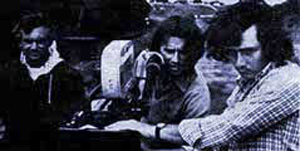
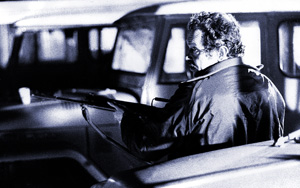
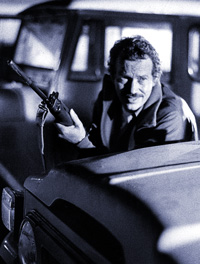
Warren Oates
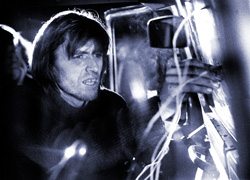
Special Effects Director Geoff Murphy fixing
explosives to jeep window
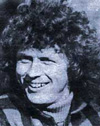 Director Roger Donaldson
Director Roger Donaldson
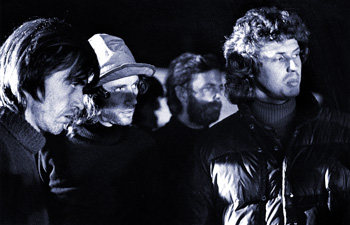
Geoff Murphy, Michael Seresin, John Reid, Roger Donaldson
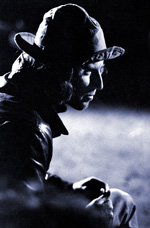
Director of Photography
Michael Seresin








